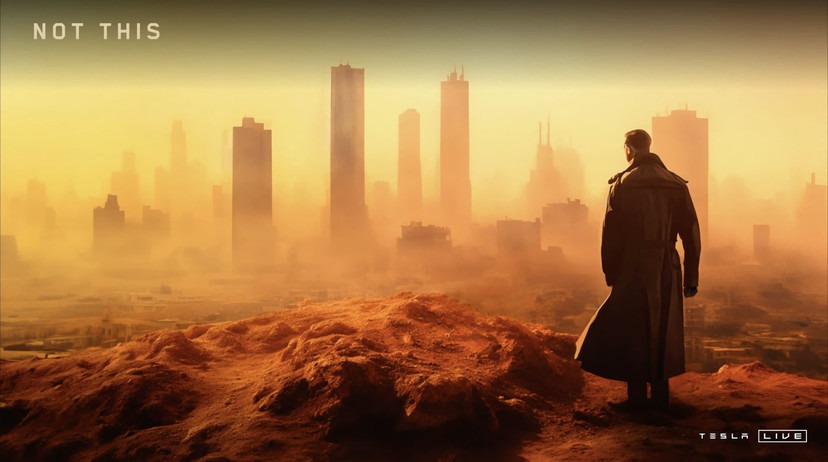Uncertainty surrounds the potential market release of the self-driving vehicles showcased at Tesla’s recent We, Robot presentation. Amidst this ambiguity, Alcon Entertainment, the production company behind Blade Runner 2049, has filed a lawsuit against Tesla, Elon Musk, and Warner Bros. Discovery. The suit alleges that an AI image generator was employed to create promotional materials for the We, Robot event, which allegedly mimicked imagery from the 2017 sci-fi film.
According to Alcon, which holds the copyright for Blade Runner 2049, a request was made by Tesla and Warner Bros. to utilize visuals from the film on October 10, just hours before the demo was set to take place at the Warner Bros. lot in California. Although Warner Bros. possesses some licensing rights for the movie, any approval for using these images was required to come directly from Alcon since the event was to be live-streamed globally. Once Alcon’s legal and licensing departments became aware of the situation, they promptly responded with a firm denial to the request to ensure that there was no confusion regarding the event’s conduct.
In its legal filing, Alcon elaborated on its concerns regarding potential associations between the Blade Runner brand and Musk’s controversial reputation. The company stated, “Any prudent brand considering any Tesla partnership has to take Musk’s massively amplified, highly politicized, capricious and arbitrary behavior, which sometimes veers into hate speech, into account.” Alcon expressed its desire to dissociate Blade Runner 2049 from Musk, Tesla, and any of Musk’s affiliated companies due to these concerns.
Despite the refusal from Alcon, Tesla reportedly proceeded to input images from Blade Runner 2049 into an AI image generator, resulting in the creation of what was described as a “lightly stylized fake screen still.” This image was prominently featured during the We, Robot presentation. During the event, Musk even mentioned the Blade Runner franchise by name while discussing sci-fi portrayals of the future, coinciding with a livestream cut to an image of a man clad in a duster jacket against a backdrop of a devastated, apocalyptic city.

In addition to the broader copyright infringement allegations, Alcon contends that it was not informed of any agreements between Tesla and Warner Bros. that would have been necessary prior to the We, Robot event. Alcon asserts that this agreement granted Tesla access to Warner Bros.’ facilities and equipment, but it likely also included a promotional element that “allowed or possibly even required Tesla expressly to affiliate the Cybercab with one or more motion pictures” from Warner Bros.’ catalog.
While the lawsuit does not specify the amount of damages Alcon is seeking, it clearly states that the company believes Musk, Tesla, and Warner Bros. were all aware of the unauthorized nature of the image and the inappropriate purpose behind its creation. Furthermore, Alcon alleges that these parties encouraged or supported the endeavor despite knowing it was not authorized.
The legal actions taken by Alcon highlight significant concerns surrounding copyright issues, particularly in an age where AI technology can generate content based on existing works. This case could set a precedent regarding the use of AI-generated images and how they relate to intellectual property rights. As companies increasingly utilize AI to create promotional materials, the lines between originality and infringement become blurred, raising important questions about accountability and ownership in creative works.
Alcon’s pursuit of legal action may serve as a warning to other companies that the use of AI to replicate or draw from existing intellectual property without permission can have serious legal consequences. As more industries explore the potential of AI-generated content, the implications for copyright laws will likely come under increased scrutiny.
The situation underscores the ongoing tension between technological advancement and intellectual property rights. As creators seek to leverage the benefits of AI in their marketing and production efforts, it is crucial to ensure that they operate within the boundaries of existing copyright laws. Failure to do so could result in legal disputes like the one currently unfolding between Alcon and Tesla.
In the ever-evolving landscape of technology and media, it remains essential for companies to prioritize transparency and compliance with copyright regulations. As the case progresses, it may provide valuable insights into how businesses can navigate the complex relationship between AI innovation and the protection of creative works. Alcon’s case against Tesla and Musk serves as a reminder that while the technological landscape is rapidly changing, the foundations of intellectual property law still hold significant weight in protecting the rights of original creators.
